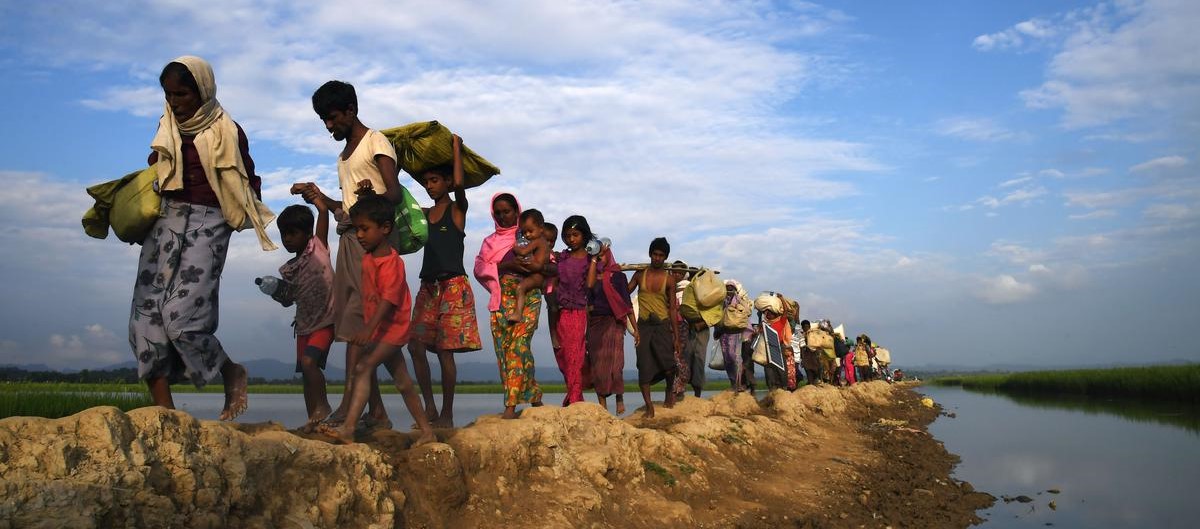ICC may prosecute Myanmar
September 7, 2018 | Expert Insights

The international criminal court has ruled it can prosecute Myanmar for alleged crimes against humanity against the Rohingya people, an unprecedented decision that could expose the country’s politicians and military leaders to charges.
Background
The Rohingya are an ethnic Muslim minority group from Myanmar’s western Rakhine state practicing a variation of Sunni Islam. There are reportedly one million Rohingya in Myanmar. The government of Myanmar has, however, refused to recognize them as one of its ethnic groups. A UN report has said that the treatment of Rohingya was tantamount to ethnic cleansing. Researchers from the International State Crime Initiative (ISCI), published a report citing compelling evidence of mass annihilation and genocide. Personal accounts by refugees paint a horrific tale of rape, pillaging, and violence.
The international community has expressed its concern over the plight of the Rohingya Muslims and the escalating violence. The UN Secretary-General Antonio Guterres said that the violence in the region has "spiraled into the world's fastest-developing refugee emergency, a humanitarian and human rights nightmare." He added, “We've received bone-chilling accounts from those who fled, mainly women, children and the elderly.”
According to a UN fact-finding mission, Myanmar's senior military officials must be prosecuted for genocide and war crimes against the Rohingya and other ethnic minorities. The UN report said that military generals, including Commander-in-Chief Min Aung Hlaing, must face investigation and prosecution for genocide in north Rakhine State, as well as crimes against humanity and other war crimes in Kachin, Shan and Rakhine states. EU and Canada have imposed sanctions on Burmese military and police officials over human rights violations against Myanmar's Rohingya population in Rakhine state.
Read more of our extensive analysis on the human rights crisis in Myanmar here, here and here
Analysis
A pre-trial chamber at the court in The Hague said on Thursday that even though Myanmar was not a signatory to the court, its leaders could still be investigated for the crime of deportation, the forcible transfer of a population.
ICC prosecutors had mounted a novel argument that even though the allegedly coercive acts that forced the Rohingya to flee took place in Myanmar, the crime would not have been completed until the refugees entered Bangladesh, which is a party to the Rome Statute that governs the court.
Chief prosecutor Fatou Bensouda likened deportation to “a cross-border shooting”, arguing that the crime “is not completed until the bullet (fired in one state) strikes and kills the victim (standing in another state)”.
The decision opens the doors for ICC prosecutors to apply for a full-blown investigation into Myanmar for deportation and other crimes against humanity, including genocide. Prosecutors are currently conducting a preliminary examination in a bid to gather enough evidence to convince the court to open a formal investigation. Should the court follow its usual time frame, any charges against Burmese leaders would likely be at least five years away.
The UN last month, issued a damning report accusing Myanmar’s military of genocide and other crimes against the Rohingya and minorities in the country.
More than 700,000 Rohingya fled to Bangladesh, starting in August 2017, after the Burmese army launched “clearance operations” against what they called terrorists in northern Rakhine state. The refugees say they were indiscriminately shot at, burned and raped by Burmese soldiers and Buddhist militiamen. Now, more than a million, live in camps in southern Bangladesh that are so densely populated and sprawling they constitute the fourth-largest city in the country.
The UN report said it found conclusive evidence that the actions of the Burmese armed forces, known as the Tatmadaw, “undoubtedly amounted to the gravest crimes under international law” in Rakhine as well as in Kachin and Shan, states also riven by internal conflicts.
The Myanmar government is yet to react to the decision but argued last month that the ICC prosecutors’ request was “meritless and should be dismissed”.
Scrutiny of Myanmar’s action in Rakhine state in the security council has so far been blocked by Russia and China, both veto-wielding powers.
Counterpoint
Any charges brought against the offenders could take years. The prosecutor must now examine whether a trial is in the interest of victims, whether serious local investigations are taking place and whether the gravity of the crimes merit opening a formal investigation. Even if a case goes ahead, the court has no powers to execute an arrest warrant or a summons against Myanmar officials and the court depends on member states to bring officials to trial in The Hague.
Assessment
Our assessment is that if any Burmese leaders were eventually charged, the ICC would also be limited in its capacity to enforce the decisions and bring them to trial in The Hague. We feel that in the absence of its own police force, the ability to enforce its own decisions is limited by the functionality – or lack of function – of the UN security council.








Comments